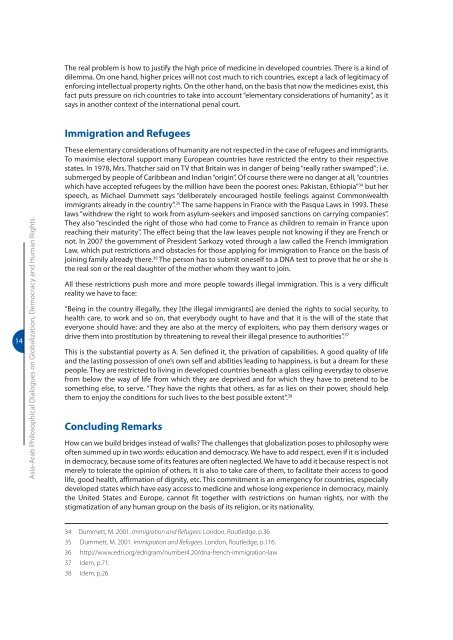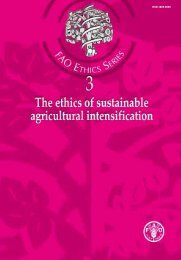Asian-Arab philosophical dialogues on globalization, democracy ...
Asian-Arab philosophical dialogues on globalization, democracy ...
Asian-Arab philosophical dialogues on globalization, democracy ...
Create successful ePaper yourself
Turn your PDF publications into a flip-book with our unique Google optimized e-Paper software.
The real problem is how to justify the high price of medicine in developed countries. There is a kind of<br />
dilemma. On <strong>on</strong>e hand, higher prices will not cost much to rich countries, except a lack of legitimacy of<br />
enforcing intellectual property rights. On the other hand, <strong>on</strong> the basis that now the medicines exist, this<br />
fact puts pressure <strong>on</strong> rich countries to take into account “elementary c<strong>on</strong>siderati<strong>on</strong>s of humanity”, as it<br />
says in another c<strong>on</strong>text of the internati<strong>on</strong>al penal court.<br />
14<br />
Asia-<str<strong>on</strong>g>Arab</str<strong>on</strong>g> Philosophical Dialogues <strong>on</strong> Globalizati<strong>on</strong>, Democracy and Human Rights<br />
Immigrati<strong>on</strong> and Refugees<br />
These elementary c<strong>on</strong>siderati<strong>on</strong>s of humanity are not respected in the case of refugees and immigrants.<br />
To maximise electoral support many European countries have restricted the entry to their respective<br />
states. In 1978, Mrs. Thatcher said <strong>on</strong> TV that Britain was in danger of being “really rather swamped”; i.e.<br />
submerged by people of Caribbean and Indian “origin”. Of course there were no danger at all, “countries<br />
which have accepted refugees by the milli<strong>on</strong> have been the poorest <strong>on</strong>es: Pakistan, Ethiopia” 34 but her<br />
speech, as Michael Dummett says “deliberately encouraged hostile feelings against Comm<strong>on</strong>wealth<br />
immigrants already in the country”. 35 The same happens in France with the Pasqua Laws in 1993. These<br />
laws “withdrew the right to work from asylum-seekers and imposed sancti<strong>on</strong>s <strong>on</strong> carrying companies”.<br />
They also “rescinded the right of those who had come to France as children to remain in France up<strong>on</strong><br />
reaching their maturity”. The effect being that the law leaves people not knowing if they are French or<br />
not. In 2007 the government of President Sarkozy voted through a law called the French Immigrati<strong>on</strong><br />
Law, which put restricti<strong>on</strong>s and obstacles for those applying for immigrati<strong>on</strong> to France <strong>on</strong> the basis of<br />
joining family already there. 36 The pers<strong>on</strong> has to submit <strong>on</strong>eself to a DNA test to prove that he or she is<br />
the real s<strong>on</strong> or the real daughter of the mother whom they want to join.<br />
All these restricti<strong>on</strong>s push more and more people towards illegal immigrati<strong>on</strong>. This is a very difficult<br />
reality we have to face:<br />
“Being in the country illegally, they [the illegal immigrants] are denied the rights to social security, to<br />
health care, to work and so <strong>on</strong>, that everybody ought to have and that it is the will of the state that<br />
every<strong>on</strong>e should have; and they are also at the mercy of exploiters, who pay them derisory wages or<br />
drive them into prostituti<strong>on</strong> by threatening to reveal their illegal presence to authorities”. 37<br />
This is the substantial poverty as A. Sen defined it, the privati<strong>on</strong> of capabilities. A good quality of life<br />
and the lasting possessi<strong>on</strong> of <strong>on</strong>e’s own self and abilities leading to happiness, is but a dream for these<br />
people. They are restricted to living in developed countries beneath a glass ceiling everyday to observe<br />
from below the way of life from which they are deprived and for which they have to pretend to be<br />
something else, to serve. “They have the rights that others, as far as lies <strong>on</strong> their power, should help<br />
them to enjoy the c<strong>on</strong>diti<strong>on</strong>s for such lives to the best possible extent”. 38<br />
C<strong>on</strong>cluding Remarks<br />
How can we build bridges instead of walls? The challenges that globalizati<strong>on</strong> poses to philosophy were<br />
often summed up in two words: educati<strong>on</strong> and <strong>democracy</strong>. We have to add respect, even if it is included<br />
in <strong>democracy</strong>, because some of its features are often neglected. We have to add it because respect is not<br />
merely to tolerate the opini<strong>on</strong> of others. It is also to take care of them, to facilitate their access to good<br />
life, good health, affirmati<strong>on</strong> of dignity, etc. This commitment is an emergency for countries, especially<br />
developed states which have easy access to medicine and whose l<strong>on</strong>g experience in <strong>democracy</strong>, mainly<br />
the United States and Europe, cannot fit together with restricti<strong>on</strong>s <strong>on</strong> human rights, nor with the<br />
stigmatizati<strong>on</strong> of any human group <strong>on</strong> the basis of its religi<strong>on</strong>, or its nati<strong>on</strong>ality.<br />
34 Dummett, M. 2001. Immigrati<strong>on</strong> and Refugees. L<strong>on</strong>d<strong>on</strong>, Routledge, p.36<br />
35 Dummett, M. 2001. Immigrati<strong>on</strong> and Refugees. L<strong>on</strong>d<strong>on</strong>, Routledge, p.116.<br />
36 http://www.edri.org/edrigram/number4.20/dna-french-immigrati<strong>on</strong>-law<br />
37 Idem, p.71.<br />
38 Idem, p.26.

















